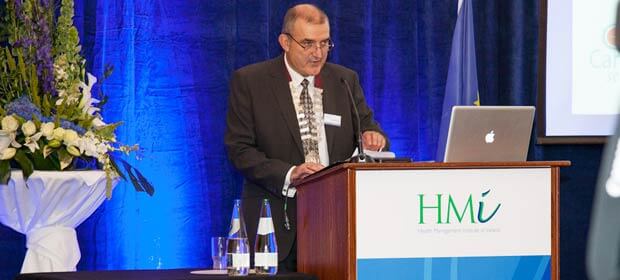HMI President, Mr. Richard Dooley urged that we must “move away from the control paradigm that has evolved and that is in danger of making technocrats of people who joined the health services primarily to foster positive health strategies and deliver positive health outcomes to the communities that we serve”, when he opened the Institute’s 2nd National Conference in Dublin. Maureen Browne reports.
Conference speakers would address issues of policy, assess the experience of health service managers including from further afield, and challenge long held beliefs and mind-sets about how we actually deliver our services, he told almost 300 delegates – including many of the country’s most senior health managers – who packed the Ballroom in the Gresham Hotel.

He said that more than ever clarity was required around the service delivery model into the future. In a time of reducing resources, increased regulation and more stringent performance and quality targets, the tried and trusted was no longer fit for purpose and new mindsets were needed. The HMI Conference presented an opportunity for service managers to engage in this discussion.
“As individual managers it is our duty to so engage, to embrace change and to foster the environment that supports it, as a profession of managers we stand ready to lead to where that future will take us, let today be the next step in that direction.”
As individual managers it is our duty to so engage, to embrace change and to foster the environment that supports it, as a profession of managers we stand ready to lead to where that future will take us
The Conference was taking place against the background which has never been more challenging for health service managers. “We are in our fourth year of successive and extensive budget cuts which had seen almost €2 billion removed from our funding base with a loss of almost 5,000 staff over the same period.
“As a professional body of managers we have been blamed for the manifestation of many of the ills of our system, many of which have been outside our control. As a professional body of managers we have, in the most admirable fashion, dealt with the financial tsunami that has swamped the state in recent years. With great effort and against the odds we have retained and strengthened the integrity of our service delivery. We have met all service challenges that emerged or were imposed upon us. We continue to deliver in an environment of ever increasing and ever stretching service targets while at the same time managing the consequences and risks of what is perhaps the biggest unplanned down-sizing in the history of this state. Above all else we have continued to show leadership at all levels and to all those staff on whom we depend; and who, in turn, depend on us for the clarity and direction that our system badly needs.”
Mr. Dooley said the requirement for such clarity and direction was as urgent now as ever before. This not only extended to structure but must also embrace the underlying philosophy in how we planned and delivered services. it extended to a clear definition and statement of the key relationships that must be in place to oversee an efficient, inclusive and responsive delivery system.
A key relationship to be resolved was how our state viewed its health service managers, what it expected from them and how this could best be delivered. The resolution of this was to be found in the formalisation and professionalisation of health service management.
“We need to train and develop health service managers to agreed professional standards so that they have the leadership, managerial and technical competencies to lead and manage in what is a very complex environment. In a HMI/University of Limerick survey conducted in early 2011 it was the overwhelming view of health service managers that there should be investment in their training and development and that this must be a formal and fully accredited process that will allow the professional health service manager at various levels stand shoulder to shoulder with his other professional colleagues. It will bring professional value, confidence and authority to the supporting infrastructure and is an investment that will benefit the service into the future and ultimately the health and social gain of those we serve.”
As a professional body of managers we have been blamed for the manifestation of many of the ills of our system, many of which have been outside our control
The HMI President said there were other key relationships to be progressed and nurtured. It was important now that because of the current and serious financial stresses in the system that a disconnect between those who planned and those who delivered was avoided at all costs. Some would say that the evidence of this was already in place and would point to the current HSE deficit and a perceived unreality around what could be delivered in 2012 within the funding available.
He said mechanisms must be developed and put in place in the planning process to strengthen connectivity at all levels so that there was consistency in messaging and a reality about expectations from the highest level and to every delivery point. The connectivity must be meaningful and inclusive and based on an understanding that values a ground-up approach to setting service targets that are achievable and how best such services can be delivered.
The HMI was dedicated to meeting the needs of the modern healthcare manager by providing its members with up to date and relevant information, training and professional development services, and networking opportunities.
The main sponsors of the HMI 2nd National Conference were GSK and Cornmarket with the following additional companies supporting the conference, Cardiac Services, Core HR, MSD, Fanning, Global Diagnostics, Philips, Portobello College, SHRC Limited and TragPI.

